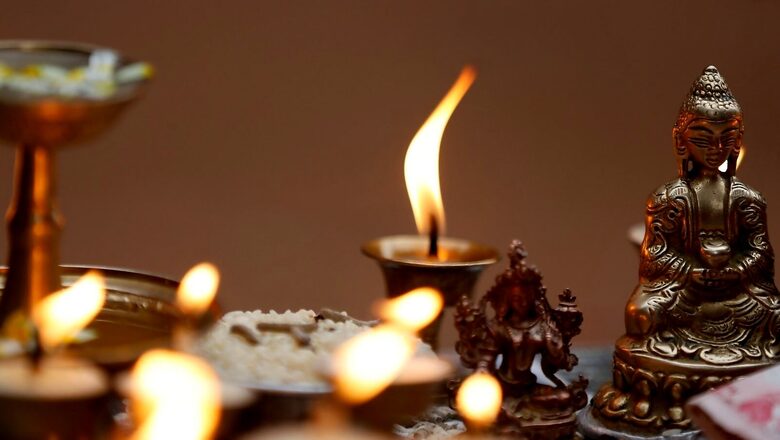
views
Prime Minister Narendra Modi is scheduled to fly to Nepal on Buddh Purnima today to pay a visit to Lumbini, the birthplace of Lord Buddha in Nepal, nearly seven months after inaugurating the Kushinagar airport in October last year.
According to reports, the PM will land at the newly constructed Kushinagar airport from where he would visit a Buddha temple, situated around 4km away, and later leave for Nepal in a chopper. Kushinagar is a Buddhist pilgrimage spot.
The BJP has been focusing heavily on reinvigorating India’s global and pan-Asia ties with Buddhism, even as the party has worked to consolidate the support of the Dalit community, who often embrace the religion. In 1956, Dr BR Ambedkar, the most revered Dalit icon, turned to Buddhism. The religion’s association with a Dalit icon, who is regarded as the foremost leader who fought for their rights and had them enshrined in the Indian Constitution, is bound to have its own social and political weight.
“Ambedkar reinvigorated Buddhism in India, and many Buddhists in India give gratitude to him for improving their lives,” Ajahin Prasheel Ratana Gautam, a distinguished Buddhist monk once told the Indian Express.
The political grapevine is also alight with the possibility that Modi’s visit could help the BJP reconnect with Dalits, who make up the Bahujan Samaj Party’s core voters (BSP).
BSP’s Downfall
In the recently held Uttar Pradesh assembly elections, the Bahujan Samaj Party (BSP) displayed its most dismal performance in the state. Mayawati had claimed the party would form an ‘iron clad’ government in UP, and while the declaration seemed far-fetched to most at the time, the party’s performance has proved it downright contradictory.
Mayawati has served four separate terms as the Chief Minister of UP. But now, according to political commentators, her party may be heading towards oblivion. And other parties have been quick to jump on the bandwagon, including the Congress, which is hoping to revive its Dalit-Muslim-Brahmin formula of the 80s.
As Even Jatavs Become Estranged, BJP Pushes Ahead
Mayawati’s sub-caste, the Jatavs, have a 14% share of the scheduled caste population. The BSP has received only 12.9% of the vote, indicating that even Jatavs may have abandoned the party. The BSP could win only one seat in the state. In 2017, the BSP received 22.2% of the vote and 19 seats. This indicates that the party has lost nearly 10% of its vote share.
In the background of this political situation, the BJP is steaming ahead with its focus on Buddhism.
PM Modi is scheduled to visit Lumbini (Nepal) on May 16, 2022 which is Lord Buddha’s birthplace recognised as a UNESCO world heritage site. The PM is expected to pay his reverence at the Mayadevi temple, which marks the birthplace of the Lord Buddha, born more than 2,600 years ago. Nepal’s Prime Minister Sher Bahadur Deuba is also expected to join PM Modi to mark the occasion of Buddha Purnima.
This would be the second Summit level interaction between the two Prime Ministers in less than two months after PM Deuba travelled to India for a bilateral visit in April 2022. This would also mark PM Modi’s first visit to Nepal since he was re-elected in 2019. In his previous term, he visited Nepal on four occasions, including twice in 2014 and twice in 2018. In May 2018, PM Modi had undertaken similar religious and cultural visits when he visited Janakpur and Muktinath.
And also, an upcoming museum dedicated to the Buddha has been envisaged in the national capital as part of the ongoing Central Vista Project.
In October 2016, the ‘5th International Buddhist Conclave’ was held in Varanasi, Hindu-Buddhist Initiative on Conflict Avoidance in Bodh Gaya. India also organised international conferences that facilitated interaction between members across sectarian and national boundaries such as ‘Buddhism in the 21st Century’ conference at Rajgir in 2017.
The opening of the Nalanda University is another example of India’s commitment to the cause.
The China Connect
During Nepal’s PM visit to India in April 2022, PM Narendra Modi and Sher Bahadur Deuba inaugurated passenger rail services between Jaynagar in India and Kurtha in Nepal. This rail link will be the first broad gauge passenger rail service in Nepal. The establishment of the Jayanagar-Kurtha rail line is also a part of priority to trade and cross-border connectivity initiatives for a smooth, hassle-free exchange of people between the two countries.
The rail link between the two neighbouring countries is part of an overall strategy for improved border management, planned and integrated development of border areas and infrastructure in a selective and phased manner.
Another important issue for Nepal is air connectivity. Nepal requested India to provide three additional entry routes from Mahendranagar, Nepalgunj and Janakpur,and also finalised another agreement on near-border operation for the Gautam Buddha International Airport, Bhairahawa, Nepal.
The airport, located less than 10 kilometres from the Indo-Nepali border, will start operations from May 20, 2022. The use of Indian RuPay card in Nepal was jointly launched by India and Nepal last month. This would open new vista for cooperation in financial connectivity, and is expected to facilitate bilateral tourist flows as well as further strengthen people-to-people linkages between India and Himalayan state.
Interestingly, China has proposed to link Lumbini by road and railway to Tibetan town of Kyirong on the Chinese-Nepali border, which would effectively connect it to the BRI network. China’s Buddhist soft power initiative has focused on strengthening its relationship with other Buddhist countries, which of course includes those involved in BRI negotiations, such as Sri Lanka also. Actually, the use of Buddhism to promote the BRI programme was explicitly listed on the agenda at the 2018 World Buddhist Forum, which China hosts every three years.
Nepalese PM Deuba’s visit to India and Indian PM Modi’s visit to Nepal would produce mixed results but at the least, it has resumed high-level political engagement between the two countries. It has also brought normalcy to Nepal’s geo-strategic debate by bringing India back into the fold. It gives a strong message that India is not only promoting the spiritualism and Buddhism in its own land but also in Nepal, a report by IANS said.
With inputs from IANS
Read all the Latest Politics News here



















Comments
0 comment